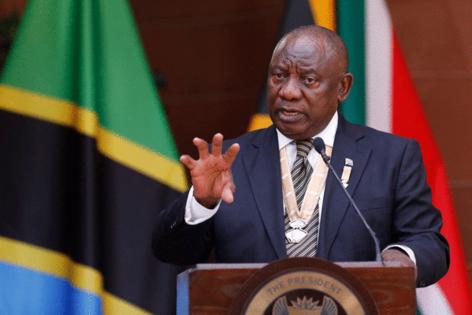South Africa, US in talks on white Afrikaner resettlement
Published in News & Features
JOHANNESBURG, South Africa — South Africa’s government is engaging U.S. authorities about the Trump administration’s plan to resettle white Afrikaners to ensure the program doesn’t provide an opportunity for fugitives to flee.
A group of about 100 Afrikaners, an ethnic group descended mainly from Dutch and French settlers, are scheduled to travel to the U.S. on a chartered flight next week, according to two South African government officials.
South Africa hasn’t been advised yet who the people are and the authorities are keen to ensure no wanted individuals leave the country, according to the officials who asked not to be identified because they’re not authorized to speak to the media.
“There are ongoing diplomatic engagements on this issue in particular, as well as other related key matters of bilateral and mutual interest,” South African Presidency spokesman Vincent Magwenya said by text message. The discussions are expected to continue through the weekend.
Talks took place on Friday between South African Deputy International Relations and Cooperation Minister Alvin Botes and U.S. Deputy Secretary of State Christopher Landau, the foreign ministry said in a statement in the capital, Pretoria, on Friday. South Africa has sought information on the status of the people who will be traveling to the U.S. and assurances that they’ve been appropriately vetted, it said.
Spokespeople for the White House and the Department of Homeland Security didn’t immediately respond to requests for comment.
The talks are part of a broader effort by President Cyril Ramaphosa’s government to repair relations with the U.S., its second-biggest trading partner, that have become increasingly strained since President Donald Trump took office in January.
Trump has accused the government of seizing land from white Afrikaners and offered to resettle them as refugees in the U.S. Elon Musk, the president’s South Africa-born billionaire backer, has spread a conspiracy theory that there is a “genocide” of white people in the country.
The government hasn’t seized any land since the end of apartheid in 1994. South African crime statistics show that the highest number of people being murdered in the country are young Black men.
Ramaphosa said on April 24 he had a call with his U.S. counterpart to discuss the two countries’ relations. During that conversation, Ramaphosa conveyed to Trump that he had been given false information about the country, Magwenya said.
“Our position is that there are no South African citizens that can be classified as refugees to any part of the world, including the U.S.,” he said. “On the contrary, South Africa has been and remains a home for refugees from all over the world.”
About 7% of South Africa’s 63 million people are white, and 11% of the population speak Afrikaans as their home language.
Afrikaner lobby group Solidarity previously declined Trump’s offer to resettle its members in February and confirmed on Friday that its position hasn’t changed. The group also wasn’t involved in facilitating the move of the people scheduled to be resettled next week, spokesman Flip Buys said.
Solidarity opposes race quotas that have been imposed by the government, including mandatory targets for hiring and promoting people within specific race groups as a means to redress the economic imbalances wrought by apartheid, when Black South Africans were excluded from the economy.
In a letter to Ramaphosa in February, Solidarity denied approaching the U.S. administration about an alleged genocide against white people, or that it was responsible for the U.S.’s “negative attitude” toward the African National Congress, the largest party in South Africa’s coalition government.
The New York Times reported earlier on Friday on the planned resettlement of the first white Afrikaners next week.
(Hadriana Lowenkron and Ana Monteiro contributed to this report.)
©2025 Bloomberg L.P. Visit bloomberg.com. Distributed by Tribune Content Agency, LLC.







Comments